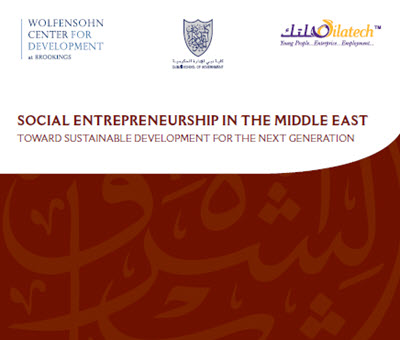This joint report—published by Silatech, the Middle East Youth Initiative, the Wolfensohn Center for Development, and the Dubai School of Government—lays a foundation for a better understanding of the importance of social entrepreneurship in the Middle East.
Despite the promise of an increasingly educated population of young people, the Middle East’s “youth bulge” generates pressure on education systems, labor markets, health care, natural resources and infrastructure. In this context, and with constrained public and private resources, traditional development frameworks in the Middle East are proving inadequate and are in need of transformation. Within the complex ecosystem of domestic governments, international donors, private businesses and individual philanthropists, the emerging model of social entrepreneurship offers potential as being one model to address the multi-sectoral challenges young people face in the Middle East.
This report draws on existing literature to focus on four central principles of social entrepreneurship:
- Achievement of positive social impact: Social entrepreneurship responds to communities that have been marginalized or excluded by existing market actors and non-market institutions;
- Non-conventional thinking: Social entrepreneurship aims for what Joseph Schumpeter called “creative destruction,” a revolutionary transformation of a pattern of production which is often associated with entrepreneurship at large but, in the case of social entrepreneurship, is applied to social challenges;
- Use of sustainable methods: Social entrepreneurship must include a strategy for achieving financial sustainability, such as earning income; and,
- Innovation that can be adapted and “scaled up” beyond the local context: It is by pioneering ideas that can be applied at a larger scale that social entrepreneurship is able to contribute to systemic and path-breaking change.
Social entrepreneurship often requires more than one individual to achieve impact and, often, a dedicated organization through which to carry out its work. The social enterprise is an organization with a clear social mission and a strategy that combines resourcefulness and innovation, which allow it to be financially sustainable. Social enterprises can assume a variety of legal and organizational models, but generally can be divided into four categories:
- Leveraged nonprofits capitalize on the interest of a variety of stakeholders to operate and to secure ongoing support based on a diversified portfolio of funding.
- Enterprising nonprofits have a self-financing component contributing to the organization’s sustainability.
- Hybrid enterprises combine aspects of the for-profit and nonprofit legal models, either through an innovative legal structure or by using a for-profit subsidiary to support the social activities of the nonprofit.
- Social businesses are those that can demonstrate market-level financial performance and competitiveness while expressing an equal or greater commitment to a social aim.
Several trends in the region point to the important role that social entrepreneurship can play in capitalizing on the youth bulge, including an increased sense of social commitment expressed by a growing youth population, the incremental yet increasing ease of doing business in many of the countries, and the growing strategic orientation that is being adopted by the region’s philanthropic donors. Together, these represent promising trends for social entrepreneurs seeking talent and capital to start their own enterprises. Yet only with a conducive institutional environment can social entrepreneurship grow into a transformative tool in the field of youth economic development.

